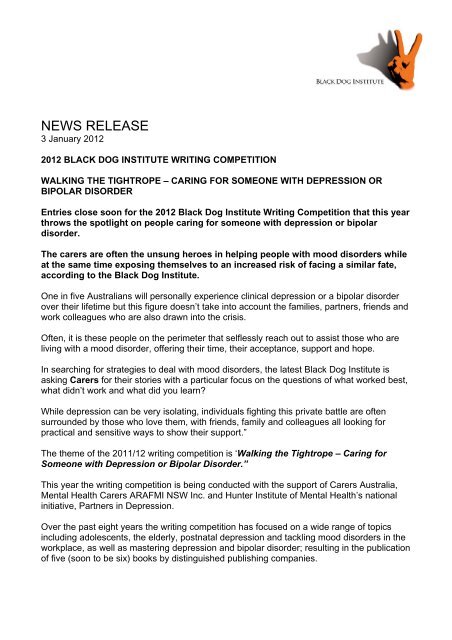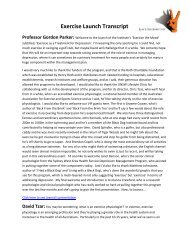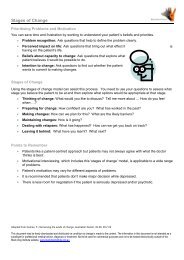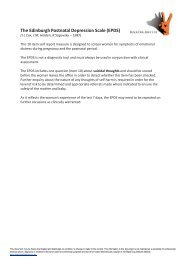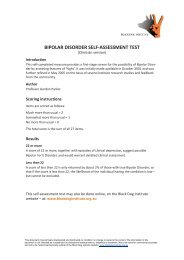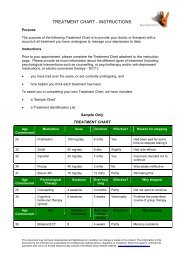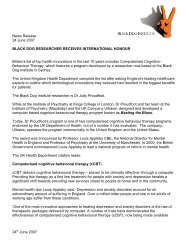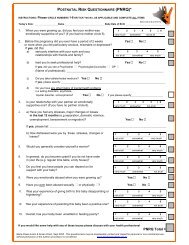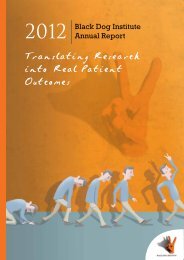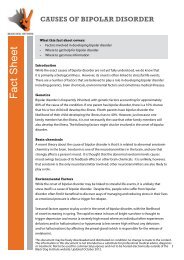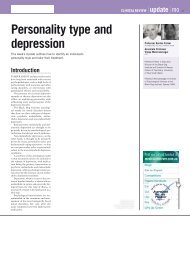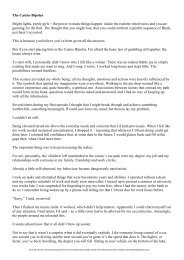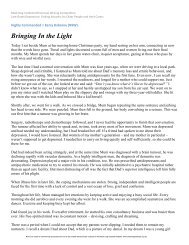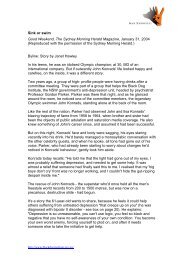Read the news release - Black Dog Institute
Read the news release - Black Dog Institute
Read the news release - Black Dog Institute
You also want an ePaper? Increase the reach of your titles
YUMPU automatically turns print PDFs into web optimized ePapers that Google loves.
NEWS RELEASE<br />
3 January 2012<br />
2012 BLACK DOG INSTITUTE WRITING COMPETITION<br />
WALKING THE TIGHTROPE – CARING FOR SOMEONE WITH DEPRESSION OR<br />
BIPOLAR DISORDER<br />
Entries close soon for <strong>the</strong> 2012 <strong>Black</strong> <strong>Dog</strong> <strong>Institute</strong> Writing Competition that this year<br />
throws <strong>the</strong> spotlight on people caring for someone with depression or bipolar<br />
disorder.<br />
The carers are often <strong>the</strong> unsung heroes in helping people with mood disorders while<br />
at <strong>the</strong> same time exposing <strong>the</strong>mselves to an increased risk of facing a similar fate,<br />
according to <strong>the</strong> <strong>Black</strong> <strong>Dog</strong> <strong>Institute</strong>.<br />
One in five Australians will personally experience clinical depression or a bipolar disorder<br />
over <strong>the</strong>ir lifetime but this figure doesn’t take into account <strong>the</strong> families, partners, friends and<br />
work colleagues who are also drawn into <strong>the</strong> crisis.<br />
Often, it is <strong>the</strong>se people on <strong>the</strong> perimeter that selflessly reach out to assist those who are<br />
living with a mood disorder, offering <strong>the</strong>ir time, <strong>the</strong>ir acceptance, support and hope.<br />
In searching for strategies to deal with mood disorders, <strong>the</strong> latest <strong>Black</strong> <strong>Dog</strong> <strong>Institute</strong> is<br />
asking Carers for <strong>the</strong>ir stories with a particular focus on <strong>the</strong> questions of what worked best,<br />
what didn’t work and what did you learn<br />
While depression can be very isolating, individuals fighting this private battle are often<br />
surrounded by those who love <strong>the</strong>m, with friends, family and colleagues all looking for<br />
practical and sensitive ways to show <strong>the</strong>ir support.”<br />
The <strong>the</strong>me of <strong>the</strong> 2011/12 writing competition is ‘Walking <strong>the</strong> Tightrope – Caring for<br />
Someone with Depression or Bipolar Disorder.”<br />
This year <strong>the</strong> writing competition is being conducted with <strong>the</strong> support of Carers Australia,<br />
Mental Health Carers ARAFMI NSW Inc. and Hunter <strong>Institute</strong> of Mental Health’s national<br />
initiative, Partners in Depression.<br />
Over <strong>the</strong> past eight years <strong>the</strong> writing competition has focused on a wide range of topics<br />
including adolescents, <strong>the</strong> elderly, postnatal depression and tackling mood disorders in <strong>the</strong><br />
workplace, as well as mastering depression and bipolar disorder; resulting in <strong>the</strong> publication<br />
of five (soon to be six) books by distinguished publishing companies.
“ Most books on depression and bipolar disorder have been written from <strong>the</strong> outside looking<br />
in. Drawing toge<strong>the</strong>r perceptions and personal accounts from those who have experienced<br />
such mood disorders- whe<strong>the</strong>r personally or in this case, as a Carer - allows us to reverse<br />
this approach. ‘Inside out’ views offer rich information that assists in breaking down <strong>the</strong>ir<br />
mysteries and <strong>the</strong>ir management and are particularly appreciated by general readers<br />
Essays are to be no longer than 1500 words and will need to include:<br />
• At least two recommendations which will be collated into a list of tips to help<br />
all carers.<br />
(For example, <strong>the</strong>re was <strong>the</strong> case of a couple that adopted <strong>the</strong> following practice when one<br />
of <strong>the</strong>m was depressed. They would hold hands and while looking into each o<strong>the</strong>r’s eyes,<br />
jump up and down. Not before long, <strong>the</strong>y were laughing at each o<strong>the</strong>r; thus providing a fun<br />
way of finding a ‘circuit breaker’ to override this black cloud of depression.<br />
(There was also a couple living in London. When one of <strong>the</strong>m was feeling depressed, <strong>the</strong>y<br />
would go cycling around London – at 2.00am and 3.00am.)<br />
• At least two useful strategies such as <strong>the</strong> type of support services or websites<br />
that proved <strong>the</strong> most helpful and practical.<br />
The 2012 competition invites entries from <strong>the</strong> Australasian region.<br />
Prizes will be awarded for <strong>the</strong> three best essay entries.<br />
First Place: $2000; Second Place $1000 and Third Place $500.<br />
The closing date for receipt of entries is 31 January 2012.<br />
Participants are required to complete an application form and forward, where possible, an<br />
electronic copy of <strong>the</strong>ir essay to blackdog@blackdog.org.au<br />
plus an original copy of <strong>the</strong> essay on A4 paper (paper clip/not stapled) by post, addressed<br />
to:<br />
<strong>Black</strong> <strong>Dog</strong> <strong>Institute</strong> Writing Competition<br />
<strong>Black</strong> <strong>Dog</strong> <strong>Institute</strong>, Hospital Road, Prince of Wales Hospital,<br />
Randwick NSW 2031<br />
An application form and fur<strong>the</strong>r information can be obtained via <strong>the</strong> <strong>Institute</strong>’s website<br />
(www.blackdoginstitute.org.au) or by telephoning (02) 9382 4523. An independent judging<br />
panel will select <strong>the</strong> winning entries and <strong>the</strong>y will be announced early in 2012.<br />
Media Inquiries: Contact Ian Dose, Media Manager at <strong>the</strong> <strong>Black</strong> <strong>Dog</strong> <strong>Institute</strong>, mobile:<br />
0419 618 606 or email: i.dose@unsw.edu.au


